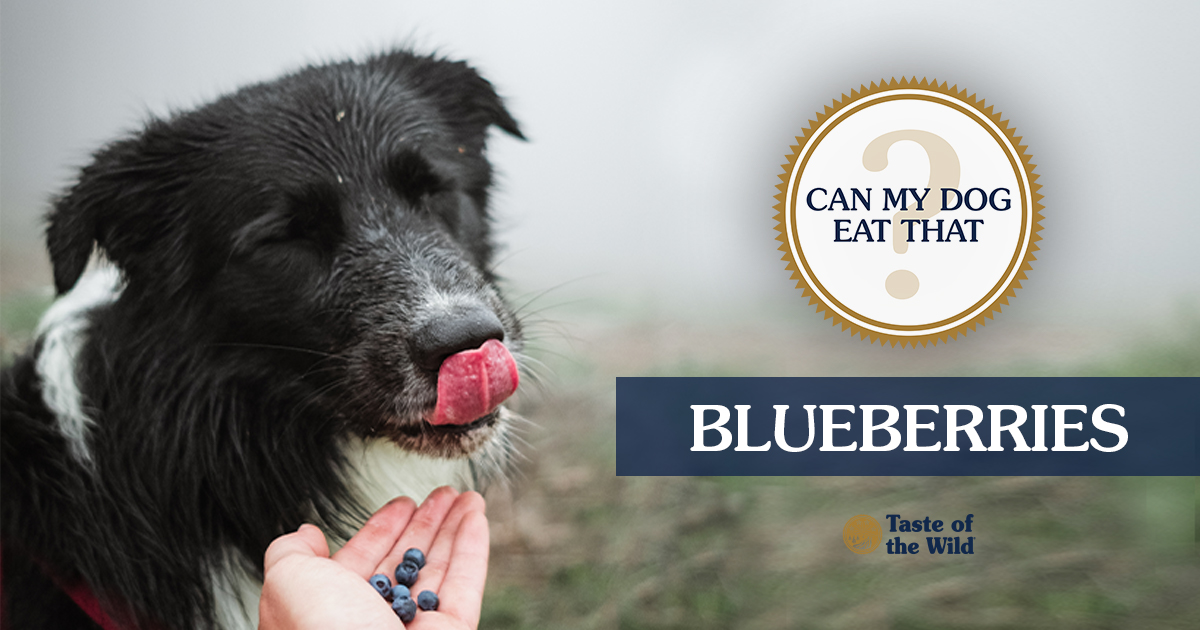
Welcome to “Can My Dog Eat That?,” our series that answers some obvious (and not-so-obvious) questions about what your dog can and can’t safely eat. Read on!
Can dogs have blueberries? For humans, blueberries are arguably a perfect snack. They’re loaded with nutrients like fiber and vitamin C. They’re low in calories because of a high water content. They’re poppable. And, possibly most importantly, they taste good!
But like with many delicious human foods, you’ll often see some puppy-dog eyes (both real and metaphorical) peering at you while you snack. Is it OK if dogs eat blueberries, though? Dogs can eat watermelon and pineapple, so can your dog indulge in a few of these blue sweet treats, either whole or in any other format?
Are Blueberries Good for Dogs?
Yes, you can feed your dog blueberries in all forms. They’re a great fruit that’s often labeled as a superfood! Though it’s always a good idea to consider opting for blueberries as an ingredient in trusted dog food, you can feed your beggin’ buddy fresh or frozen blueberries in moderation. Be wary, though. Blueberries are generally small treats, but when dogs eat blueberries they are in danger of choking, especially small breeds or puppies. Frozen blueberries are especially a danger to small dogs.
When Dogs Eat Blueberries, They Eat a Superfood with Super Benefits
Because of all the nutrients blueberries offer in one tiny package, they’re often labeled as “superfoods.” These nutrient-packed fruits are key sources of antioxidants, omega fatty acids, fiber, vitamins, minerals and protein. In pet food, superfoods are also functional ingredients. Functional ingredients provide bonus benefits beyond basic nutrition when they are part of a complete and balanced diet. Antioxidants, omega fatty acids and fiber provide some of these benefits.
Blueberries’ main claim as a superfood is that they are rife with antioxidants, which is good news for pet owners. Antioxidants protect your dog from the damaging effects of free radicals, which, if left unchecked, can result in health issues like cancer and heart disease. Antioxidants in superfoods like blueberries can work with the antioxidants naturally produced by the body to control these free radicals. Antioxidants also support the immune system and maintenance of healthy skin, and it’s been proven that they can help slow your dog’s mental aging.
But the benefits don’t stop there. The fiber offered by blueberries supports healthy digestion, which is something that both dogs and dog parents can appreciate. So offering your dog blueberries in food that is already good for them, like blueberry yogurt — homemade because store- bought blueberry yogurt is loaded with sugar or xylitol, which is deadly for dogs — can allow them to have a healthy snack that they love.
Can Dogs Eat Blueberry Muffins?
Though you can feed blueberries to your dog, it’s not a good idea to offer blueberry muffins, which are usually packed with sugar. When dogs eat too much, sugar they can suffer from vomiting and diarrhea, not to mention more long-term issues like diabetes.
Can Dogs Eat Dried Blueberries?
In lieu of fresh blueberries, dried blueberries can be a great snack, especially if you dry them yourself. If you buy store-bought dried blueberries, be sure to watch the sugar content, because it is usually high.
As Always, Treat in Moderation
Too many blueberries aren’t good for anyone, especially dogs. General consensus is that your dog’s treats or snacks should consist of no more than 10 percent of your dog’s daily calorie intake. But for that 10 percent? You can’t go wrong with blueberries. If you’d prefer to offer blueberries as a portion of your dog’s regular food, we have a few suggestions. As always, if you have any questions about feeding fruits or vegetables to your dog, consult your veterinarian.

RELATED POST: Can My Dog Eat That: A Guide by Taste of the Wild
The information in this blog has been developed with our veterinarian and is designed to help educate pet parents. If you have questions or concerns about your pet's health or nutrition, please talk with your veterinarian.
